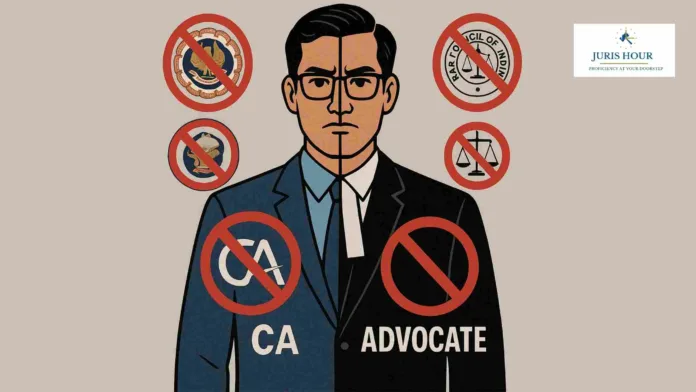A recurring professional and legal question continues to generate debate in India’s legal and financial fraternity — can a Chartered Accountant (CA) simultaneously hold a Certificate of Practice (CoP) from the Institute of Chartered Accountants of India (ICAI) and also be enrolled as an Advocate under the Advocates Act, 1961?
Dozens of Chartered Accountants have recently been searched and even arrested for their alleged roles in GST frauds. This has sparked a tongue-in-cheek observation in professional circles: perhaps they should obtain a law degree to get permanent immunity. Interestingly, though, one can’t be both — a CA and an Advocate — at the same time. One must be given up for the other.
Statutory Conflict Between Two Professions
At the heart of the issue lies a clear conflict between the rules laid down by the Bar Council of India (BCI) and those of the ICAI. Under Rule 49 of the Bar Council of India Rules, an Advocate is prohibited from engaging in any other profession, business, or employment while practising law. The rule states that an Advocate cannot be a full-time salaried employee or otherwise engaged in another profession if they intend to continue practising before courts.
Simultaneously, the ICAI’s Regulation 190A stipulates that a Chartered Accountant must obtain prior permission from the Council to engage in any other business or occupation. Although the ICAI permits certain ancillary activities with approval, the active practice of law is not among them.
Therefore, the dual practice of law and accountancy — by holding both a Certificate of Practice from ICAI and an active enrollment with the Bar — is generally barred.
The Bar Council of India has consistently reiterated through circulars that Advocates cannot engage in any other gainful activity, including holding a CA’s CoP. Likewise, the ICAI has clarified through its guidelines and FAQs that practising as an Advocate while holding a CoP is not permitted.
The Narrow Window of Technical Compliance
However, there exists a narrow technical space where dual qualifications are legally permissible, though not concurrently active. A person may:
- Be enrolled as an Advocate but not practise law, while holding a valid CA CoP.
- Alternatively, hold an LLB degree and be enrolled with the Bar, but not hold a CA CoP, if they intend to practise as an Advocate.
In both cases, it is the active practice — not the qualification or mere enrollment — that triggers professional conflict.
Implications for Dual Professionals
For professionals who hold both qualifications, this dichotomy necessitates a choice. Holding and actively using both professional licences is not legally viable. This has practical implications for those interested in setting up Multi-Disciplinary Practices (MDPs) or who intend to diversify their client offerings in areas where both financial and legal expertise overlap, such as taxation, white-collar crime defence, or compliance consultancy.
Here’s a snapshot:
| Scenario | Permissible? | Remarks |
| Holding CoP + Active Bar Enrollment | No | Violates BCI Rule 49 |
| Advocate (Inactive) + CA with CoP | Yes | Bar enrollment only, not active legal practice |
| Active Advocate + CA without CoP | Yes | Subject to ICAI rules |
| Holding degrees only, without practising either | Yes | Academic qualifications do not conflict |
The Road Ahead
As regulatory reforms gather momentum and the push for MDPs grows, there have been periodic calls for a structured framework allowing dual practice under regulation. However, no formal relaxation has been granted yet. Until legislative or institutional changes occur, Rule 49 of the BCI and Regulation 190A of the ICAI remain clear: one cannot be an active CA and a practising Advocate at the same time.
Read More: CBIC Cadre Restructuring 2025: What Officers Should Know

